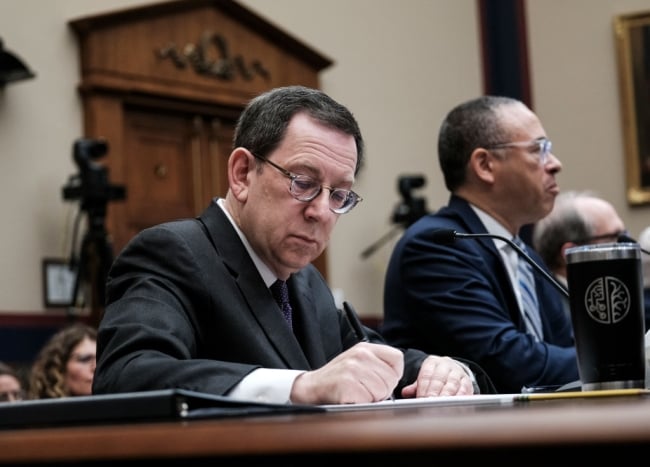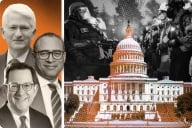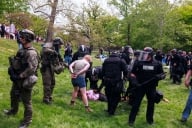You have /5 articles left.
Sign up for a free account or log in.

Northwestern president Michael Schill (left) and Rutgers president Jonathan Holloway testified at Thursday’s Congressional hearing on campus antisemitism, alongside UCLA chancellor Gene Block.
Michael A. McCoy/Getty Images
During Thursday’s Congressional hearing about campus antisemitism, the leaders of Northwestern University, Rutgers University, and the University of California, Los Angeles, emerged largely unscathed, despite contentious questions from lawmakers.
The three leaders—Michael Schill of Northwestern, Jonathan Holloway of Rutgers and Gene Block of UCLA—were called before Congress to discuss alleged antisemitic incidents on their campuses and their handling of the pro-Palestinian encampments that sprung up at all three universities.
While several Congressional Republicans (and a small group of Democrats) raged, the campus leaders appeared unfazed, remaining calm and collected in the face of sometimes barbed questioning. They seemed to have absorbed the lessons of the presidents who occupied the hot seat before them, demonstrating care and concern for their students while providing guarded answers and refusing to be intimidated by their interrogators.
Campus Leaders in the Crosshairs
It was their varying responses to the encampments that first attracted Congressional attention. Both Northwestern and Rutgers struck deals with the protesters, agreeing to meet certain demands in exchange for voluntary removal of tents. The UCLA encampment, however, descended into violence after it was attacked by counterdemonstrators. But with limited exception, Congress had little to say about the violence at UCLA, focusing instead on the markedly more peaceful protests at Northwestern and Rutgers.
In particular, the committee took issue with what members described as capitulation to “pro-terror” protesters.
“Each of you should be ashamed of your decisions that allowed antisemitic encampments to endanger Jewish students. Mr. Schill and Dr. Holloway you should be doubly ashamed for capitulating to the antisemitic rule breakers,” said North Carolina representative Virginia Foxx, the Republican chairwoman of the House Education and Workforce Committee, which called the hearing.
Foxx also accused the presidents of not doing their jobs by refusing to “preserve campus safety, and protect Jewish students."
Across the aisle, Virginia representative Bobby Scott, the senior Democrat on the committee, questioned the whole premise of the hearing, arguing that students have the right to voice “politically unpopular or morally abhorrent” opinions.
After opening remarks from Foxx, Scott and the three leaders, the attention turned to Schill—and remained there for much of the day as he fielded numerous questions focused on Northwestern.
A legal scholar and former president of the University of Oregon before making the leap to Northwestern in 2022, Schill kept his cool even as he clashed with Congress on a handful of questions.
Responding to Representative Tim Walberg, a Michigan Republican who asked about Northwestern faculty support of the boycott, divestment and sanctions movement, Schill pushed back.
“I will not be discussing individual faculty members,” Schill said calmly but firmly.
His response contrasted sharply with answers by Columbia University President Minouche Shafik, who spoke out against statements made by Columbia professors at April’s hearing. Shafik was later accused of throwing faculty members “under the bus” before Congress.
Schill showed less restraint when Representative Burgess Owens questioned him on Northwestern’s campus in Qatar. The Utah Republican sought to pin the president down on a question about Qatari ties to terrorist organizations, including Hamas. When Schill batted away hypotheticals, demurred and argued that the topic was not his “area of expertise,” Owens suggested the Northwestern president had no problem with operating in a country allegedly linked to terrorism.
“I’m offended by you telling me what my views are,” Schill said testily.
Representative Bob Good, a Virginia Republican, took similar aim at Holloway, asking about the Rutgers Center for Security, Race and Rights, which he accused of trafficking antisemitic views. Specifically, he asked if Rutgers would close the “so-called think tank,” noting a recent social media post in which CSRR allegedly called the Israeli government “genocidal.” Good then asked Holloway multiple times if he considered Israel’s government to be genocidal.
“I don’t have an opinion on Israel in terms of that phrase,” Holloway said, responding that he believed Israel had a right to exist and defend itself, but without directly answering the genocide question.
Good also asked about a CSRR statement that “MAGA Republicans”—referring to supporters of former President Donald Trump—were a threat to the American Jewish community.
Holloway again sidestepped, noting that he often disagreed with CSRR positions but that as a public institution, Rutgers was required to abide by the First Amendment. Good appeared frustrated by Holloway's calm, asking: “Are you in a position to answer any questions?”
When asked if he would close CSRR, Holloway said he had “no plans to close the center.”
All three leaders were later asked if they thought Israel was a genocidal state; all three answered with an unequivocal “no”—including Holloway.
The three leaders also avoided stumbling over the question that tripped up the first presidents to testify, in December: whether hypothetical calls for the genocide of Jewish people would violate their campus policies. The question turned out to be an unexpected bombshell last year, when the presidents of Harvard University, the Massachusetts Institute of Technology and the University of Pennsylvania all equivocated in their answers; two—Liz Magill of Penn and Claudine Gay of Harvard—later lost their jobs. On Thursday, the question offered much less bang: All three leaders made clear that such calls would violate their codes of conduct.
When Schill, Holloway and Block were asked about disciplinary actions taken against students and faculty who had harassed and intimidated Jewish students, the line of questioning yielded few answers. The three leaders offered similar statements about campus incidents being investigated, emphasizing the importance of due process as the disciplinary proceedings play out.
While the bulk of the committee’s wrath emanated from the GOP and was directed at Schill and to a lesser extent, Holloway, Block was targeted by Democrats—particularly Minnesota representative Ilhan Omar, who pressed the chancellor on why police didn’t respond sooner to violent counter protesters on campus.
“You, the UCLA leadership, and law enforcement stood by for hours as the mob of agitators gathered near the encampment with a clear intention to cause violence,” Omar said, accusing Block of failing to protect the students in his care and not intervening sooner to prevent chaos.
“I reject the premise,” Block told Omar, leading to a back-and-forth between the chancellor and the lawmaker in which Block emphasized that the police are still investigating the attacks.
Testimony Fallout
In the aftermath of the hearing, Republicans cast the three leaders as moral failures.
“Complete moral cowardice will only encourage more antisemitism,” Walberg, who pressed Schill on student and faculty statements, wrote in a social media post before the hearing concluded.
“Either the ‘ongoing investigations’ we’ve heard so much about are turning up nothing of substance, or these claims of ignorance are disingenuous,” New York representative Brandon Williams wrote on X after Thursday’s hearing. “In either case, this failure to hold agitators accountable is a failure at the expense of Jewish students.”
Owens, who clashed with Schill, wrote on X: “Flat out refusing to answer yes or no questions is just the latest in a string of cowardly decisions from @NorthwesternU leadership.”
But the politicians’ outrage has not yet been matched by the public condemnation that followed when the presidents of Harvard, MIT and Penn offered what many deemed to be overly legalistic answers in December. Instead, the furor appears contained.
After contentious hearings in December and April, it seems the three leaders came prepared, likely benefitting from the lessons learned from the presidents who preceded them. The first hearing was widely panned as a disaster, with the three presidents reduced to punchlines on a Saturday Night Live skit. Thursday’s proceedings seemed devoid of the same high drama.
Hollis Robbins, dean of the College of Humanities at the University of Utah, told Inside Higher Ed via text message that while she thought the leaders did well, the hearing revealed little new information. She noted “no new questions about the relationship between antisemitism and anti-Zionism” and “no real breakthroughs on what has been driving the encampments.” She also said there was a lack of sustained discussion about the appropriate role of faculty members.
“The presidents today had the benefit of knowing the kinds of questions they’d get and were clearly prepared. But the questioning stayed in the same narrow channels, really,” she wrote.
As the hearing concluded, Foxx warned the three leaders that it was “the beginning, not the end” of Congressional inquiries into their institutions. Now, as the academic year draws to a close, most encampments have been removed, either voluntarily or by force. While the summer may bring campuses a reprieve from the protests, Congress will still be in session until August—and watching closely in a contentious election year.

f917.jpg?itok=cjynvv9F)

